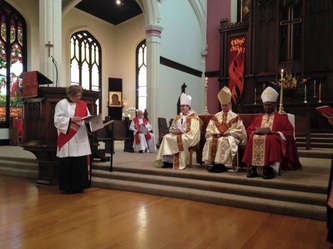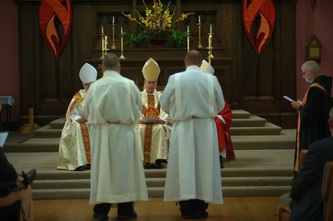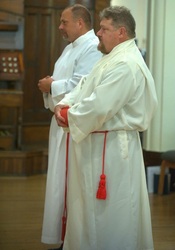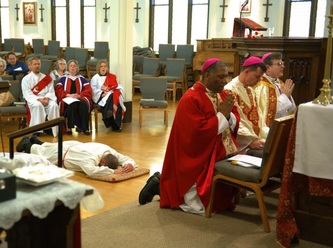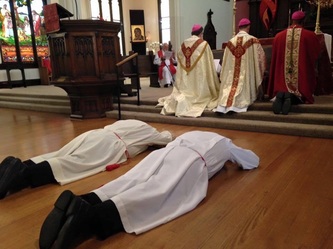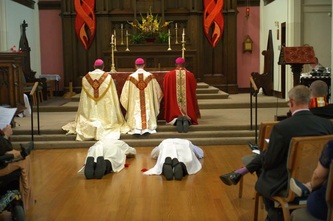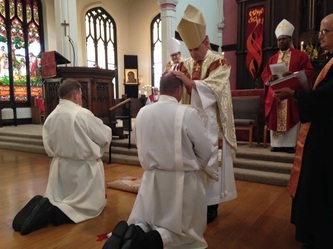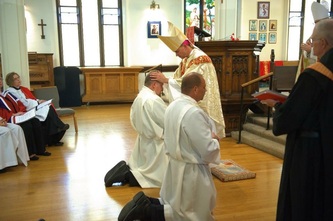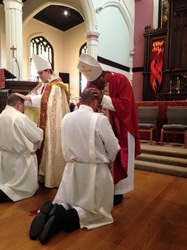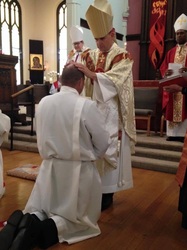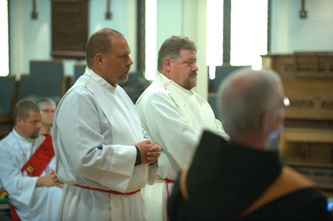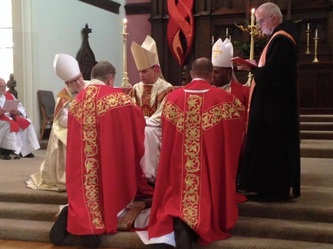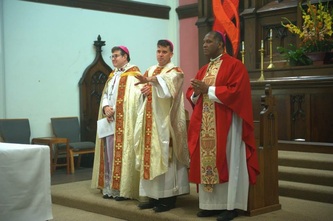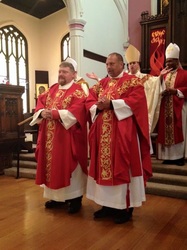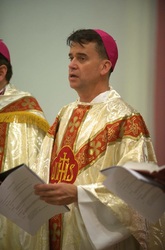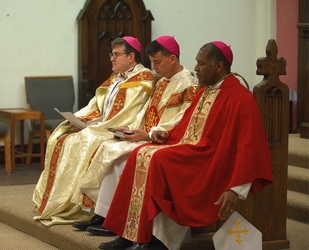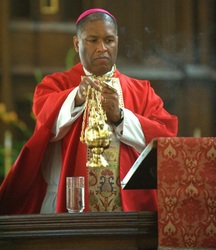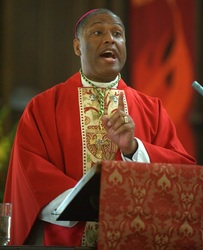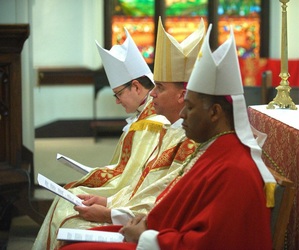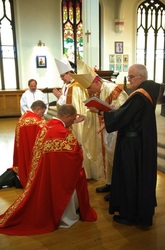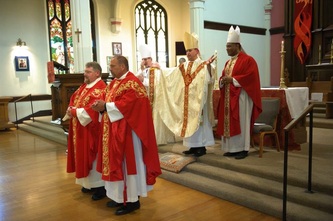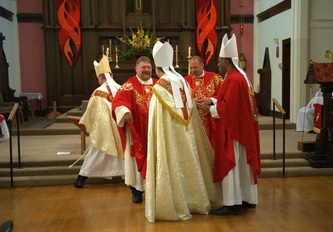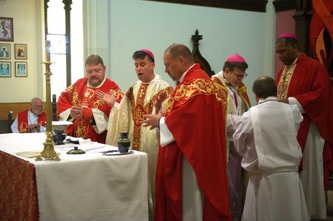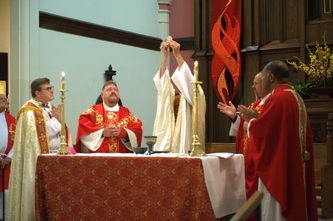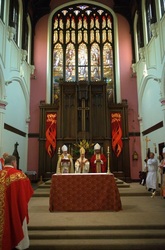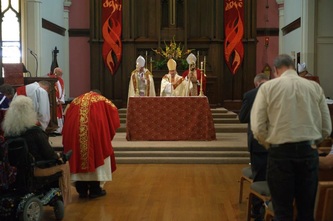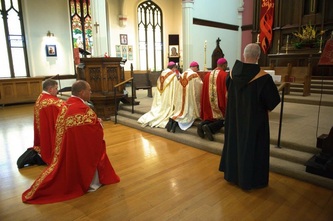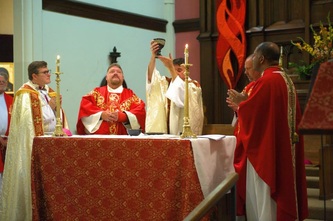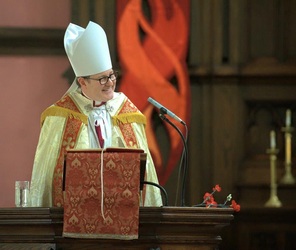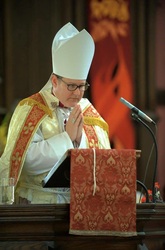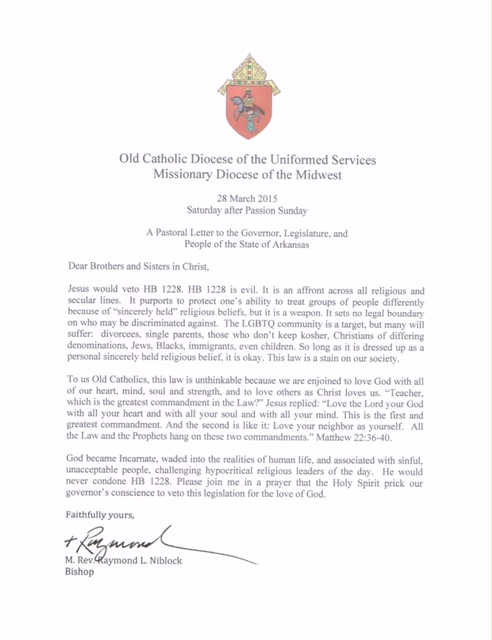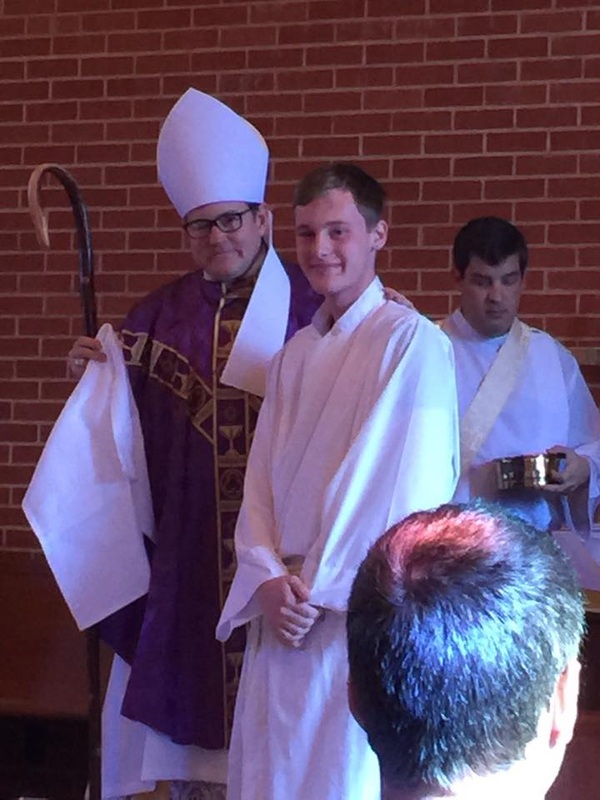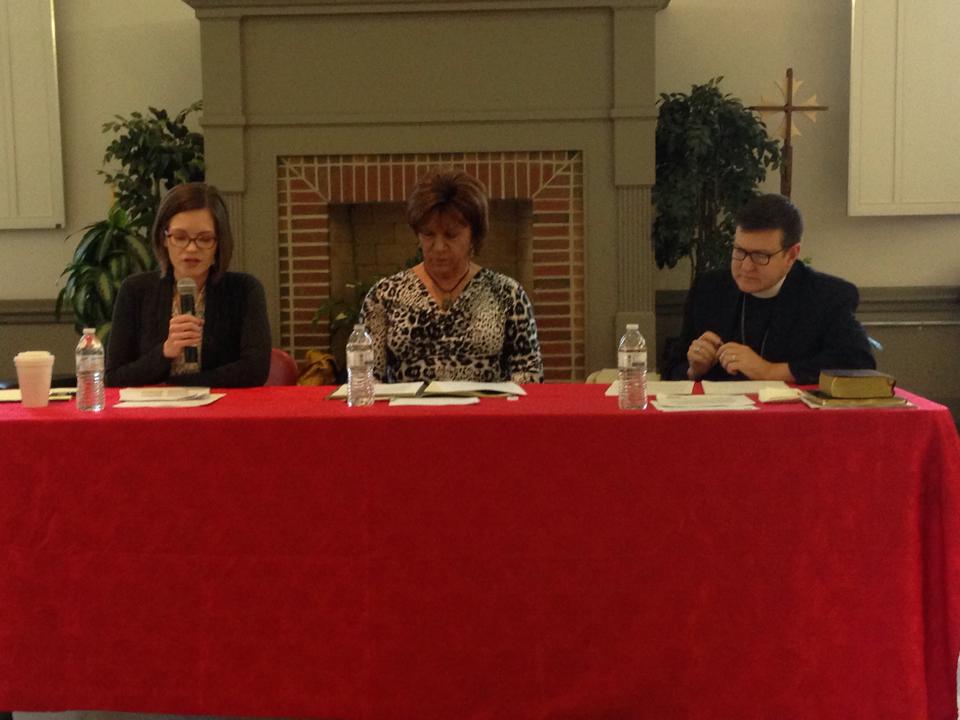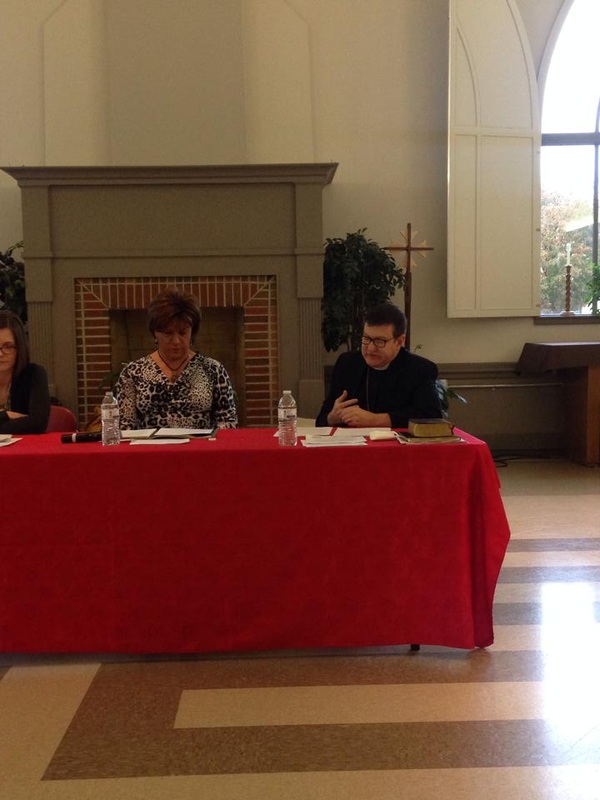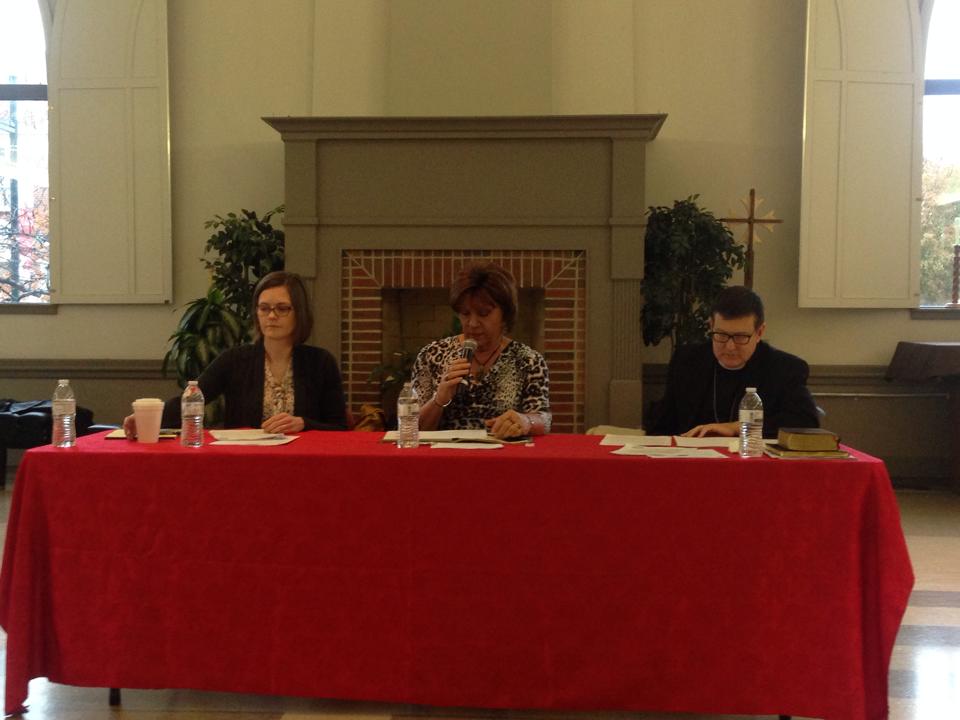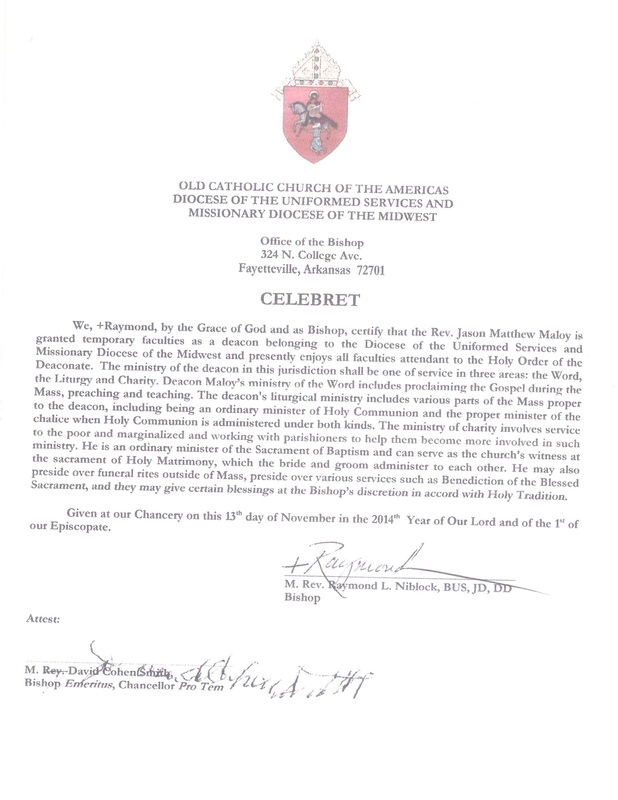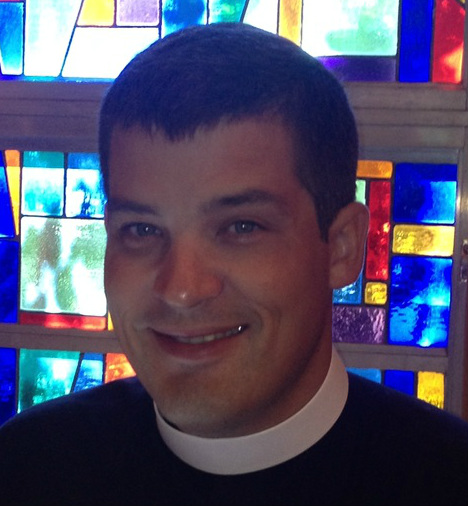News Since the Pandemic Began
Going back to the most recent post of Father Schwarz's ordination below, after his ordination, he served us in our Missionary Province of New Mexico for some years until he incardinated to a sister jurisdiction where he now serves as the Pastor of Christ The King Old Catholic Church in Albuquerque along with other responsibilities with the North American Catholic Ecumenical Church. We are grateful for his service and stay in touch with him on a regular basis to continue our cross-jurisdictional cooperation in ministry.
Then the pandemic hit. With the pandemic, the Synod of the OCCOA suppressed all the dioceses in the jurisdiction and replaced them with a missionary province that is lead by Bishop Raymond. Under Bishop Raymond's leadership, the synod is now in a position to start inviting other bishops to join in what he calls a "voluntary association of like-minded bishops" who want to cooperate in episcopal ministry. That process is ongoing, and we see linkages growing with bishops in Illinois, Montana, California, and in Uganda.
The Province is currently busy with several new aspirants who are seeking either incardination or ordination. One of those aspirants who has been advanced through the minor orders leads a prayer group in the Charlotte, NC area, and it is a growing number that meets virtually. The others are from a lot of different places including Haiti and Vanuatu. The process of bringing on new clergy takes time, so we are patiently working through all the challenges pertinent to it.
We were also fortunate to consummate a concordat between the Missionary Province and the Evangelical Catholic Church to continue our effort to reach across jurisdictional lines to find ways to cooperate and assist one another. In this instance, Bishop Raymond went with Letters Dimissorial to ordain Reverend Mother Paula Helsby, of Mount Angel, Oregon, to the priesthood on behalf of her bishop who was unable to travel at the time. The level of cooperation between jurisdictions is refreshing and unprecedented as we continue to work hand-in-glove with one another.
All in all, we continue our efforts to grow by association and affiliation, and the effort is bearing fruit.
+Raymond
February 26, 2022
Then the pandemic hit. With the pandemic, the Synod of the OCCOA suppressed all the dioceses in the jurisdiction and replaced them with a missionary province that is lead by Bishop Raymond. Under Bishop Raymond's leadership, the synod is now in a position to start inviting other bishops to join in what he calls a "voluntary association of like-minded bishops" who want to cooperate in episcopal ministry. That process is ongoing, and we see linkages growing with bishops in Illinois, Montana, California, and in Uganda.
The Province is currently busy with several new aspirants who are seeking either incardination or ordination. One of those aspirants who has been advanced through the minor orders leads a prayer group in the Charlotte, NC area, and it is a growing number that meets virtually. The others are from a lot of different places including Haiti and Vanuatu. The process of bringing on new clergy takes time, so we are patiently working through all the challenges pertinent to it.
We were also fortunate to consummate a concordat between the Missionary Province and the Evangelical Catholic Church to continue our effort to reach across jurisdictional lines to find ways to cooperate and assist one another. In this instance, Bishop Raymond went with Letters Dimissorial to ordain Reverend Mother Paula Helsby, of Mount Angel, Oregon, to the priesthood on behalf of her bishop who was unable to travel at the time. The level of cooperation between jurisdictions is refreshing and unprecedented as we continue to work hand-in-glove with one another.
All in all, we continue our efforts to grow by association and affiliation, and the effort is bearing fruit.
+Raymond
February 26, 2022
Ordination of Madison Andrew Wayne Beeler to the Deaconate
Marcy 16, 2019
Photos from the Ordination of Mark J. Schwarz, San Francisco, California August 2, 2015
Announcing the Ordination of Archdeacon Mark J. Schwarz,
August 2, 2015, San Francisco, California
Announcements for July 1, 2015
July 1, 2015
Diocesan Chancery
324 N. College Ave.
Fayetteville, Arkansas
By the Grace of God and with the consent of the faithful, we announce with great pleasure the followng appointments and acts:
On June 14, 2015, we ordained our brother, Mark J. Schwarz, to the Order of Deacons at the Cathedral Parish for the Diocese of the Uniformed Services and Missionary Diocese of the Midwest in Fayetteville, Arkansas, at 11:00 am during the principal Sunday Mass.
On June 18, 2015, we appointed the Rev. Mark J. Schwarz as Archdeacon for the Diocese of the Uniformed Services and for the Missionary Diocese of the Midwest.
On June 18, 2015, we appointed the Rev. Mark J. Schwarz as Parochial Vicar of St. Gabriel's Old Catholic Mission in Corrales, New Mexico.
On June 18, 2015, we appointed the Rev. Jason Maloy as Chancelor of the Diocese of the Uniformed Services and for the Missionary Diocese of the Midwest.
On June 18, 2015, we appointed the Rev. Jason Maloy as Parochial Vicar of the Cathederal Parish of St. Michael the Archangel in Fayetteville, Arkansas.
On June 22, 2015, we formally erected St. Gabriel's Old Catholic Mission by our decree.
This is the Lord's doing, and it is wonderful in our eyes. Psalm 118:23.
+Raymond
M. Rev. Raymond L. Niblock
Bishop
Old Catholic Diocese of the Uniformed Services
Missionary Diocese of the Midwest
Diocesan Chancery
324 N. College Ave.
Fayetteville, Arkansas
By the Grace of God and with the consent of the faithful, we announce with great pleasure the followng appointments and acts:
On June 14, 2015, we ordained our brother, Mark J. Schwarz, to the Order of Deacons at the Cathedral Parish for the Diocese of the Uniformed Services and Missionary Diocese of the Midwest in Fayetteville, Arkansas, at 11:00 am during the principal Sunday Mass.
On June 18, 2015, we appointed the Rev. Mark J. Schwarz as Archdeacon for the Diocese of the Uniformed Services and for the Missionary Diocese of the Midwest.
On June 18, 2015, we appointed the Rev. Mark J. Schwarz as Parochial Vicar of St. Gabriel's Old Catholic Mission in Corrales, New Mexico.
On June 18, 2015, we appointed the Rev. Jason Maloy as Chancelor of the Diocese of the Uniformed Services and for the Missionary Diocese of the Midwest.
On June 18, 2015, we appointed the Rev. Jason Maloy as Parochial Vicar of the Cathederal Parish of St. Michael the Archangel in Fayetteville, Arkansas.
On June 22, 2015, we formally erected St. Gabriel's Old Catholic Mission by our decree.
This is the Lord's doing, and it is wonderful in our eyes. Psalm 118:23.
+Raymond
M. Rev. Raymond L. Niblock
Bishop
Old Catholic Diocese of the Uniformed Services
Missionary Diocese of the Midwest
Support of Same-Sex Marriage Decision
Episcopal Proclamation, June 26, 2015
OLD CATHOLIC DIOCESE OF THE UNIFORMED SERVICES
MISSIONARY DIOCESE OF THE MIDWEST
+++ IN NOMINE PATRIS, ET FELII, ET SPIRITUS SANCTI, AMEN +++
26 June 2015
Pastoral Letter In Support of Obergefell v. Hodges
"There is neither Jew nor Greek, there is neither slave nor free, there is no male and female, for you are all one in Christ." Gal 3:28
As the Old Catholic Bishop in this area, we announce our gratitude for the United States Supreme Court ruling in Obergefell v. Hodges that the states cannot ban same-sex marriage pursuant to the Fourteenth Amendment to the United States Constitution. We are grateful both as a member of the civil society and as a part of the universal church of Jesus Christ.
As a citizen, we cannot think of a more laudable decision advancing notions of liberty and equal justice in recent history than this one, because "[n]o union is more profound that marriage, for it embodies the highest ideals of love, fidelity, devotion, sacrifice and family. . . ." (Kennedy, JJ, Majority Opinion). We believe as Justice Kennedy does, that people seeking same sex unions "ask for equal dignity in the eyes of the law", and the "Constitution grants them that right." The benefits to our society for encouraging stable, lasting permanent bonds among the People is unquestionably wise and long over due.
As an Old Catholic Bishop, we also believe this decision to be in line with the teachings of our Lord and Saviour Jesus Christ who reminded us that the whole of the law is fulfilled in one word: "Love", for we must "love our neighbors as [ourselves]". Gal 5:14. Hence, we write this Pastoral Letter to encourage, strengthen, and support our Christian LGBT brothers and sisters who will assuredly be faced with many questions and doubts about their faith. It is also written to support and encourage our non-Christian LGBT brothers and sisters to love one another as Christ loves them, and to keep strong in their desire to form lasting, loving relationships.
A lesson from Paul's Letter to the Romans is instructive, where the Apostle Paul refers to negative attitudes of the congregation toward Gentiles in the first chapter of Romans. He seems to stir up the self-righteous members of the church at Rome over idolatrous Gentiles who practiced all sorts of nasty things, from gossip to “unnatural” lust. Yet, when we examine the second chapter, Paul’s true purpose is revealed when he turns the tables on the self-righteous Christians at Rome and questions how they can judge others when they themselves are doing many of the things they accuse the Gentiles of doing.
If this sounds familiar, like heterosexual Christians who have a 50% divorce rate attacking gay people who wish to marry, that’s because the nature of Holy Scripture is that it is able to speak to us in modern times, across cultural differences. Paul’s argument in Romans is that Christians are saved by the grace of God through faith in Jesus Christ, not by following the Law of Moses. This is difficult for many "bible-believing" Christians to understand, much less accept, but the devil is in the details and bears closer examination than a handful of cherry-picked quotes that are used in isolation to condemn LGBT people. Moreover, it is impossible to square taking some quotes and relying on them while ignoring others. For example, under the Old Law it was a capital offense if one was a disobedient child. Duet. 21:18-21. If a woman was not found to be a virgin on her wedding night, she also would be stoned Deut. 22:21. These are only two examples of what some Christians ignore while using other aspects of the law to relegate LGBT people to second-class citizenry or in some cases even call for their execution.
The Law of Moses included the Holiness Code of Leviticus, where there are two verses that condemn men literally “acting like a woman” with other men. The Holiness Code, much like our own culture, required men to act like men and women to act like women. Mixing up gender expectations was forbidden, thought of as ritual error rather than a moral mistake. Not conforming to gender expectations also prompts today’s religious and social discomfort around transgender or intersex people, or men who are gentle rather than tough, or women who are strong rather than weak. But, “In Christ there is no longer male and female.” These words of Paul suggest that gender differences are irrelevant for the Christian in this context.
Underlying the Holiness Code of Leviticus, though, is a spiritual truth. The Holiness Code encouraged individual integrity and social harmony. To apply this spiritual truth to the lives of lesbian, gay, bisexual, transgender, as well as straight people is to challenge all of us to affirm and practice spiritual-sexual integrity and spiritual-gender integrity. It also challenges churches and governments to welcome and integrate diversity and foster justice and equal rights.
A case in point is the story of Sodom and Gomorrah. All the men of Sodom gathered to abuse the strangers visiting their city through a common practice of ancient days: gang rape. Like such rape in prisons, this act has nothing to do with sex and everything to do with humiliation. Jesus himself viewed the sin of Sodom as inhospitality, declaring that it would be better in the Day of Judgment for Sodom than for those towns that prove inhospitable to his disciples. The irony is that churches that use this story to exclude and abuse lesbian and gay people are actually practicing the sin of Sodom: inhospitality.
We, as Bishop, stress that all are welcome in the New Testament reign of God. Jesus said so. Repentance is expected, but not repentance for how God made us, as we must "stop calling unclean what God has made clean." Acts 10:15. It is true some Christians look to a list of those who will not enter the kingdom of heaven found in 1 Corinthians and claim gay people are on it. But on that list, there are two Greek words sometimes translated as one, a sure sign that their meaning is uncertain. “Malakoi” literally means “softness” and implies moral looseness. “Arsenkoitai” literally means “males who go to bed” and is a word universally used at the time in heterosexual contexts, and probably refers to sexual exploitation. Neither of these words were used to imply homosexuality. Of important note, the word "homosexuality" did not exist until 1869 when a Hungarian physician came up with the term. The word "homosexual" is not found in any of the original Hebrew or Greek.
What’s important for Christians to know is that Jesus never condemned homosexuality, and he even came to the defense of eunuchs. He defended eunuchs who could not procreate, and eunuchs, one may safely argue, had the same status then as homosexuals in religious law seem to have today according to certain sects. Jesus implied that eunuchs shall be welcomed in the kingdom of heaven, just as God said through the prophet Isaiah that eunuchs shall be welcomed in God’s “house of prayer for all peoples.”
Another interesting observation is that no opposite gender pair received so much attention on the pages of the Bible as Ruth and Naomi and David and Jonathan. "After David had finished talking with Saul, Jonathan became one in spirit with David, and he loved him as himself." 1 Sam 18:1. Though same-gender sexuality may not be modeled in scripture, same-gender love is honored and respected.
For us, Jesus continues to inspire us to do new things not even thought possible in His time. Many Christians across denominations and traditions have realized that one of those new things we learn though the Holy Spirit is that we are called to welcome lesbians, gay men, and transgender and bisexual people because they, like us all, are children of God.
Following His example, therefore, we announce and proclaim our express intention to continually open the doors to our LGBT brothers and sisters of any faith tradition and to open our hearts. It is what Jesus would have us do. If you are an LGBT person, you will be welcome in our faith community. It is further our instruction to all of the clergy within our jurisdiction that all couples who seek the witness of the church for their marriage or declaration shall be treated with equal respect and consideration regardless of whether they are of differing sex or of the same sex.
In witness hereof, We have set our Hand and Seal on this Twenty-Sixth day of the month of June during the Year of our Lord Two Thousand and Fifteen, and of our Episcopate, the First.
☩ Raymond
____________________________________
M. Rev. Raymond L. Niblock, BUS, JD, DD
Bishop
MISSIONARY DIOCESE OF THE MIDWEST
+++ IN NOMINE PATRIS, ET FELII, ET SPIRITUS SANCTI, AMEN +++
26 June 2015
Pastoral Letter In Support of Obergefell v. Hodges
"There is neither Jew nor Greek, there is neither slave nor free, there is no male and female, for you are all one in Christ." Gal 3:28
As the Old Catholic Bishop in this area, we announce our gratitude for the United States Supreme Court ruling in Obergefell v. Hodges that the states cannot ban same-sex marriage pursuant to the Fourteenth Amendment to the United States Constitution. We are grateful both as a member of the civil society and as a part of the universal church of Jesus Christ.
As a citizen, we cannot think of a more laudable decision advancing notions of liberty and equal justice in recent history than this one, because "[n]o union is more profound that marriage, for it embodies the highest ideals of love, fidelity, devotion, sacrifice and family. . . ." (Kennedy, JJ, Majority Opinion). We believe as Justice Kennedy does, that people seeking same sex unions "ask for equal dignity in the eyes of the law", and the "Constitution grants them that right." The benefits to our society for encouraging stable, lasting permanent bonds among the People is unquestionably wise and long over due.
As an Old Catholic Bishop, we also believe this decision to be in line with the teachings of our Lord and Saviour Jesus Christ who reminded us that the whole of the law is fulfilled in one word: "Love", for we must "love our neighbors as [ourselves]". Gal 5:14. Hence, we write this Pastoral Letter to encourage, strengthen, and support our Christian LGBT brothers and sisters who will assuredly be faced with many questions and doubts about their faith. It is also written to support and encourage our non-Christian LGBT brothers and sisters to love one another as Christ loves them, and to keep strong in their desire to form lasting, loving relationships.
A lesson from Paul's Letter to the Romans is instructive, where the Apostle Paul refers to negative attitudes of the congregation toward Gentiles in the first chapter of Romans. He seems to stir up the self-righteous members of the church at Rome over idolatrous Gentiles who practiced all sorts of nasty things, from gossip to “unnatural” lust. Yet, when we examine the second chapter, Paul’s true purpose is revealed when he turns the tables on the self-righteous Christians at Rome and questions how they can judge others when they themselves are doing many of the things they accuse the Gentiles of doing.
If this sounds familiar, like heterosexual Christians who have a 50% divorce rate attacking gay people who wish to marry, that’s because the nature of Holy Scripture is that it is able to speak to us in modern times, across cultural differences. Paul’s argument in Romans is that Christians are saved by the grace of God through faith in Jesus Christ, not by following the Law of Moses. This is difficult for many "bible-believing" Christians to understand, much less accept, but the devil is in the details and bears closer examination than a handful of cherry-picked quotes that are used in isolation to condemn LGBT people. Moreover, it is impossible to square taking some quotes and relying on them while ignoring others. For example, under the Old Law it was a capital offense if one was a disobedient child. Duet. 21:18-21. If a woman was not found to be a virgin on her wedding night, she also would be stoned Deut. 22:21. These are only two examples of what some Christians ignore while using other aspects of the law to relegate LGBT people to second-class citizenry or in some cases even call for their execution.
The Law of Moses included the Holiness Code of Leviticus, where there are two verses that condemn men literally “acting like a woman” with other men. The Holiness Code, much like our own culture, required men to act like men and women to act like women. Mixing up gender expectations was forbidden, thought of as ritual error rather than a moral mistake. Not conforming to gender expectations also prompts today’s religious and social discomfort around transgender or intersex people, or men who are gentle rather than tough, or women who are strong rather than weak. But, “In Christ there is no longer male and female.” These words of Paul suggest that gender differences are irrelevant for the Christian in this context.
Underlying the Holiness Code of Leviticus, though, is a spiritual truth. The Holiness Code encouraged individual integrity and social harmony. To apply this spiritual truth to the lives of lesbian, gay, bisexual, transgender, as well as straight people is to challenge all of us to affirm and practice spiritual-sexual integrity and spiritual-gender integrity. It also challenges churches and governments to welcome and integrate diversity and foster justice and equal rights.
A case in point is the story of Sodom and Gomorrah. All the men of Sodom gathered to abuse the strangers visiting their city through a common practice of ancient days: gang rape. Like such rape in prisons, this act has nothing to do with sex and everything to do with humiliation. Jesus himself viewed the sin of Sodom as inhospitality, declaring that it would be better in the Day of Judgment for Sodom than for those towns that prove inhospitable to his disciples. The irony is that churches that use this story to exclude and abuse lesbian and gay people are actually practicing the sin of Sodom: inhospitality.
We, as Bishop, stress that all are welcome in the New Testament reign of God. Jesus said so. Repentance is expected, but not repentance for how God made us, as we must "stop calling unclean what God has made clean." Acts 10:15. It is true some Christians look to a list of those who will not enter the kingdom of heaven found in 1 Corinthians and claim gay people are on it. But on that list, there are two Greek words sometimes translated as one, a sure sign that their meaning is uncertain. “Malakoi” literally means “softness” and implies moral looseness. “Arsenkoitai” literally means “males who go to bed” and is a word universally used at the time in heterosexual contexts, and probably refers to sexual exploitation. Neither of these words were used to imply homosexuality. Of important note, the word "homosexuality" did not exist until 1869 when a Hungarian physician came up with the term. The word "homosexual" is not found in any of the original Hebrew or Greek.
What’s important for Christians to know is that Jesus never condemned homosexuality, and he even came to the defense of eunuchs. He defended eunuchs who could not procreate, and eunuchs, one may safely argue, had the same status then as homosexuals in religious law seem to have today according to certain sects. Jesus implied that eunuchs shall be welcomed in the kingdom of heaven, just as God said through the prophet Isaiah that eunuchs shall be welcomed in God’s “house of prayer for all peoples.”
Another interesting observation is that no opposite gender pair received so much attention on the pages of the Bible as Ruth and Naomi and David and Jonathan. "After David had finished talking with Saul, Jonathan became one in spirit with David, and he loved him as himself." 1 Sam 18:1. Though same-gender sexuality may not be modeled in scripture, same-gender love is honored and respected.
For us, Jesus continues to inspire us to do new things not even thought possible in His time. Many Christians across denominations and traditions have realized that one of those new things we learn though the Holy Spirit is that we are called to welcome lesbians, gay men, and transgender and bisexual people because they, like us all, are children of God.
Following His example, therefore, we announce and proclaim our express intention to continually open the doors to our LGBT brothers and sisters of any faith tradition and to open our hearts. It is what Jesus would have us do. If you are an LGBT person, you will be welcome in our faith community. It is further our instruction to all of the clergy within our jurisdiction that all couples who seek the witness of the church for their marriage or declaration shall be treated with equal respect and consideration regardless of whether they are of differing sex or of the same sex.
In witness hereof, We have set our Hand and Seal on this Twenty-Sixth day of the month of June during the Year of our Lord Two Thousand and Fifteen, and of our Episcopate, the First.
☩ Raymond
____________________________________
M. Rev. Raymond L. Niblock, BUS, JD, DD
Bishop
Announcing the Ordination of Mark J. Schwarz to the Holy Order of Deacons on June 14, 2015, at St. Michael the Archangel, Fayetteville, Arkansas, 11:00 am.
June 7, 2015
First Sunday after Trinity
Fayetteville, Arkansas
St. Michael the Archangel
Cathedral Parish
By the Grace of God and with the consent of the faithful, we announce with great pleasure our intention to ordain our brother, Mark J. Schwarz, to the Holy Order of Deacons on June 14, 2015, at the Cathedral Parish for the Diocese of the Uniformed Services and Missionary Diocese of the Midwest in Fayetteville, Arkansas, at 11:00 am during the principal Sunday Mass.
We wish him Grace and Godspeed!
+Raymond
M. Rev. Raymond L. Niblock
Bishop
Old Catholic Diocese of the Uniformed Services
First Sunday after Trinity
Fayetteville, Arkansas
St. Michael the Archangel
Cathedral Parish
By the Grace of God and with the consent of the faithful, we announce with great pleasure our intention to ordain our brother, Mark J. Schwarz, to the Holy Order of Deacons on June 14, 2015, at the Cathedral Parish for the Diocese of the Uniformed Services and Missionary Diocese of the Midwest in Fayetteville, Arkansas, at 11:00 am during the principal Sunday Mass.
We wish him Grace and Godspeed!
+Raymond
M. Rev. Raymond L. Niblock
Bishop
Old Catholic Diocese of the Uniformed Services
Video from St. Michael's 2015 Easter Vigil Celebration
Schedule for Holy Week Services
Easter Week Schedule of Services at Saint Michaels:Maundy Thursday, Assemble at 6 o'clock pm, Mass at 6:30 pmMaundy...
Posted by Saint Michael the Archangel Old Catholic Church on Tuesday, March 31, 2015
Bishop's Pastoral Letter Opposing Arkansas "Religious Freedom" Law
Admission of Madison Andrew Beeler to the Clerical State (Tonsure)
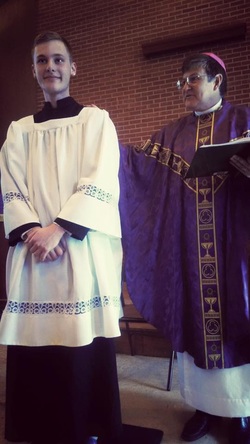 Madison Andrew Beeler (left)
Bishop Ray Niblock (right)
Madison Andrew Beeler (left)
Bishop Ray Niblock (right)
March 15, 2015
Fayetteville, Arkansas
St. Michael the Archangel
Cathedral Parish
By the Grace of God, we announce with great pleasure the admission our our brother, Madison Beeler, to the Clerical State by conferring upon him tonsure according to the ancient rites of the church.
Please pray for Madison as he begins his new journey.
We wish him Grace and Godspeed!
+Raymond
M. Rev. Raymond L. Niblock
Bishop
Old Catholic Diocese of the Uniformed Services
Fayetteville, Arkansas
St. Michael the Archangel
Cathedral Parish
By the Grace of God, we announce with great pleasure the admission our our brother, Madison Beeler, to the Clerical State by conferring upon him tonsure according to the ancient rites of the church.
Please pray for Madison as he begins his new journey.
We wish him Grace and Godspeed!
+Raymond
M. Rev. Raymond L. Niblock
Bishop
Old Catholic Diocese of the Uniformed Services
Admission of Mark J. Schwarz to the Clerical State and Minor Orders
 Mr. Mark J. Schwarz
Lay Missionary and Chaplain
Mr. Mark J. Schwarz
Lay Missionary and Chaplain
March 11, 2015
Corales, New Mexico
By the Grace of God, we announce with great pleasure the admission our our brother, Mark J. Schwarz, to the Clerical State by conferring upon him tonsure according to the ancient rites of the church. He was also ordained to the Office of Door Keeper (Porter) as part of his journey to the priesthood.
Please pray for Mark as he begins his new journey by extending the ministry of the Diocese of the Uniformed Services to service men and women, veterans, and retirees, who live in the Albuquerque, New Mexico area.
We wish him Grace and Godspeed!
+Raymond
M. Rev. Raymond L. Niblock
Bishop
Old Catholic Diocese of the Uniformed Services
Corales, New Mexico
By the Grace of God, we announce with great pleasure the admission our our brother, Mark J. Schwarz, to the Clerical State by conferring upon him tonsure according to the ancient rites of the church. He was also ordained to the Office of Door Keeper (Porter) as part of his journey to the priesthood.
Please pray for Mark as he begins his new journey by extending the ministry of the Diocese of the Uniformed Services to service men and women, veterans, and retirees, who live in the Albuquerque, New Mexico area.
We wish him Grace and Godspeed!
+Raymond
M. Rev. Raymond L. Niblock
Bishop
Old Catholic Diocese of the Uniformed Services
Decree in re Authorized Devotional Materials
1 January 2015
Circumcision of Our Lord
☩ IN NOMINE PATRIS ET FILII ET SPIRITUS SANCITI, AMEN ☩
We, ☩Raymond, by the Grace of God and as Bishop of this Diocese, do hereby decree that in the addition to previous devotional materials concerning the observance of the Daily Office and Matins required by our Decree of 29 September, 2014, all faithful and clergy in our care are hereby authorized to make alternative use of the Episcopal Book of Common Prayer (1928 Edition and all subsequent revisions) for similar and additional devotional practices with the exception that our mandate for the use of the Monasticum Breviarium (Matins) according to the Rule of St. Benedict shall remain unchanged.
With these things said, we hereby authorize the following private devotional practices, rites, and liturgies as found in the Book of Common Prayer for use outside of the context of Holy Mass:
Daily Morning Prayer: Rite One
Daily Evening Prayer: Rite One
Daily Morning Prayer: Rite Two
Noonday Prayer
Order of Worship for the Evening
Daily Evening Prayer: Rite Two
Compline
Daily Devotions for Individuals and Families
The Psalter, or Psalms of David
Prayers and Thanksgivings
Out of the same Book of Common Prayer, we authorize the use of the following public Rites and Liturgies outside of the context of the Holy Mass:
Holy Baptism
Communion under Special Circumstances
Celebration and Blessing of a Marriage
The Blessing of a Civil Marriage
An Order for Marriage
Thanksgiving for the Birth or Adoption of a Child
Reconciliation of a Penitent
Ministration to the Sick
Ministration at the Time of Death
Burial of the Dead: Rite One
Burial of the Dead: Rite Two
An Order for Burial
The purpose of this adjustment to our previous requirement is primarily for pastoral reasons and in part for convenience without any sacrifice of orthodoxy. Allowing these alternatives will allow clergy time to adjust to the older traditional liturgies we otherwise require and prefer. It must be understood, however, that we reaffirm our insistence that the clergy make daily use of the English translation of the Breviarium Monasticum published at Bruges in 1925 (Matins) according to the Rule of St. Benedict. We further maintain our preference that the clergy make every effort to use the Monastic Diurnal first published in 1948 by the monks of Saint Michael's Abbey, Farnborough, England (UK) (Sixth Ed. 2004, Seventh Ed. 2011) so that we may all, as clergy, enjoy unity in the readings, prayers and psalms given the distances that divide us.
Our conviction regarding the older liturgies bears explaining, and it is through the older liturgies that we maintain our connection with the ancient church and her teachings. With respect to Matins, it is a daily exposure to the Faith as understood by the Ante-Nicene Fathers, the Nicene Fathers, and the Post-Nicene Fathers. This rich heritage is a treasure that we must nurture to properly understand and transmit the faith to future generations.
As a general proposition, we confess candidly that antiquity alone does not guarantee that a thing is better, but immemorial custom (as opposed to mere age) helps affirm that this is so, because it has stood the test of time and the judgment (and nourishment) of the pious.
Although the traditional liturgical forms are often derided as excluding the “people” from “meaningful participation” in the liturgy, we maintain that The Holy Mass is only secondarily concerned with the preferences and tastes of the faithful. Our liturgy is made to offer the spotless victim TO God, the oblation happens (and the Mass itself is designed) on our behalf. Insofar as we are called to assist at Mass and offer the participation of heart and mind, it behooves us to have liturgy that draws us into the sacred mystery, rather than keeping us confronted with the presence and personality of our fellow men – including the priest.
By contrasting example in the Roman Church, the Novus Ordo was designed as an ecumenical gesture. The same notion of redesigning the liturgy to fit modern times as an ecumenical gesture is not unique to the Romans as we have seen other communions “modernize” their respective liturgies to be more culturally relevant. Nonetheless, and with all respect to those intentions, we believe the departure from the traditional liturgies handed to us diminishes and eliminates the sacred truths and the rich symbolism that were once dripping from every prayer and gesture of the Catholic Mass. In the effort to be more “relevant”, the Church stripped away repetition in the name of eliminating what is “useless” and forgets the pedagogical value of reinforcement and the numerical significance of certain repeated prayers. It weakens rubrics such that improvisation is par for the course; that abuses are easily made the norm; that reverent liturgy becomes simply one option among many.
We generally oppose the “updated ecclesiology” because in our view, the re-oriented liturgy horizontalizes what should be made vertical and makes anthropocentric what should be Christocentric. We realize these are difficult understandings to embrace, and it is because of that reason that we are willing to tolerate certain liturgies to give our faithful and clergy from different traditions time to adjust while we take it upon ourselves to assure there is proper teaching to engender a deeper love for those rich liturgies that have stood the test of time.
By way of example, there are innumerable updated rites of blessings that, in our view, remove the power of many sacramentals; there are updated sacraments, including a baptism which no longer features exorcisms as a ward against the power of the devil through original sin; there is an “updated” rite of exorcism that handicaps the ability to invoke the Church’s authority against common causes of possession; there is the change in ecumenism, which assumes a quasi-syncretistic attitude, a religious indifferentism that dampens missionary spirit and zeal for the conversion of souls to the true faith; there is a shift in political philosophy and eschatology, such that Christ’s Kingship has been made a Kingship over hearts and over Heaven and not a temporal Kingship which governs just nations who pay it homage; and the taint of the Balthasarian fantasy that Hell is empty leads us to canonize every departed soul before the body is even cold.
It is our fervent hope that all in our care may understand that we have not come to these conclusions with ease or whim; rather, we have come to these understanding over many, many years witnessing how many of us have lost the sensus Catholicus. We have given up on our belief in the devil and his minions and their relentless attacks to destroy souls. We have given up on liturgy that inspires us to fall down and worship before the majesty of God. We have given up on sacred art, architecture, music, and the Catholic intellectual life. We have given up on faith as a higher calling, one that challenges and forces us to go out like the disciples and preach the Gospel to all nations, instead feeling as though everyone is more or less on the same journey and fine where they are.
Even though it is easy to think that we are in the church to “be fed” by modern conventions, this attitude, though on the surface laudable, cannot stand. It will not work. Once we have lost what makes us Catholic, we have lost everything. With all of these things said, the traditional forms of Mass and other liturgies is not a silver bullet. However, we view the traditional forms of worship as one of the most potent safeguards of the faith. Referring again to the the Novus Ordo as an example, Catholics have abandoned the faith en masse since its inception, and that of the entire post-conciliar experiment. Going back to liturgy that worked, that was reverent, that was universal – it’s merely a first and important step towards a larger restoration of the faith. A faith that appeals to the world, that attracts it, that indicts it not with anger and condemnation but with fearsome love and a call to repentance.
The Church has never been perfect, nor will she be until the end of days. But she had power once that was squandered. She had truth that the world desperately needed and still needs. She had the cross, the sacrifice of Calvary, the angels and the saints, and the fear of the Lord. She had the exclusive claim that outside her gates, there is no salvation.
This matters more today than perhaps it ever has. Because the world has fallen so far from where it should be. We must first honor God in all that we do. Then, we must conform our minds and hearts to Him.
Lex orandi, lex credenda. The law of praying is the law of believing. It is the relationship between worship and belief, and is an ancient Christian principle which provided a measure for developing the ancient Christian creeds, the canon of scripture and other doctrinal matters based on the prayer texts of the Church, that is, the Church's liturgy. Perhaps if we pray as we believe the ancient practices of the church will inculcate a gradual understanding of these truths.
Finally, it also goes without saying that we believe the use of the alternative devotional tools found in the Book of Common Prayer are appropriate and theologically sound and absent a compelling reason to exclude their use by the faithful and the clergy, they are hereby authorized for alternative use in accord with this Decree.
Anything to the contrary, notwithstanding.
+Raymond
M. Rev. Raymond L. Niblock
Bishop
DUS Decree 15-001
1/1/15
Circumcision of Our Lord
☩ IN NOMINE PATRIS ET FILII ET SPIRITUS SANCITI, AMEN ☩
We, ☩Raymond, by the Grace of God and as Bishop of this Diocese, do hereby decree that in the addition to previous devotional materials concerning the observance of the Daily Office and Matins required by our Decree of 29 September, 2014, all faithful and clergy in our care are hereby authorized to make alternative use of the Episcopal Book of Common Prayer (1928 Edition and all subsequent revisions) for similar and additional devotional practices with the exception that our mandate for the use of the Monasticum Breviarium (Matins) according to the Rule of St. Benedict shall remain unchanged.
With these things said, we hereby authorize the following private devotional practices, rites, and liturgies as found in the Book of Common Prayer for use outside of the context of Holy Mass:
Daily Morning Prayer: Rite One
Daily Evening Prayer: Rite One
Daily Morning Prayer: Rite Two
Noonday Prayer
Order of Worship for the Evening
Daily Evening Prayer: Rite Two
Compline
Daily Devotions for Individuals and Families
The Psalter, or Psalms of David
Prayers and Thanksgivings
Out of the same Book of Common Prayer, we authorize the use of the following public Rites and Liturgies outside of the context of the Holy Mass:
Holy Baptism
Communion under Special Circumstances
Celebration and Blessing of a Marriage
The Blessing of a Civil Marriage
An Order for Marriage
Thanksgiving for the Birth or Adoption of a Child
Reconciliation of a Penitent
Ministration to the Sick
Ministration at the Time of Death
Burial of the Dead: Rite One
Burial of the Dead: Rite Two
An Order for Burial
The purpose of this adjustment to our previous requirement is primarily for pastoral reasons and in part for convenience without any sacrifice of orthodoxy. Allowing these alternatives will allow clergy time to adjust to the older traditional liturgies we otherwise require and prefer. It must be understood, however, that we reaffirm our insistence that the clergy make daily use of the English translation of the Breviarium Monasticum published at Bruges in 1925 (Matins) according to the Rule of St. Benedict. We further maintain our preference that the clergy make every effort to use the Monastic Diurnal first published in 1948 by the monks of Saint Michael's Abbey, Farnborough, England (UK) (Sixth Ed. 2004, Seventh Ed. 2011) so that we may all, as clergy, enjoy unity in the readings, prayers and psalms given the distances that divide us.
Our conviction regarding the older liturgies bears explaining, and it is through the older liturgies that we maintain our connection with the ancient church and her teachings. With respect to Matins, it is a daily exposure to the Faith as understood by the Ante-Nicene Fathers, the Nicene Fathers, and the Post-Nicene Fathers. This rich heritage is a treasure that we must nurture to properly understand and transmit the faith to future generations.
As a general proposition, we confess candidly that antiquity alone does not guarantee that a thing is better, but immemorial custom (as opposed to mere age) helps affirm that this is so, because it has stood the test of time and the judgment (and nourishment) of the pious.
Although the traditional liturgical forms are often derided as excluding the “people” from “meaningful participation” in the liturgy, we maintain that The Holy Mass is only secondarily concerned with the preferences and tastes of the faithful. Our liturgy is made to offer the spotless victim TO God, the oblation happens (and the Mass itself is designed) on our behalf. Insofar as we are called to assist at Mass and offer the participation of heart and mind, it behooves us to have liturgy that draws us into the sacred mystery, rather than keeping us confronted with the presence and personality of our fellow men – including the priest.
By contrasting example in the Roman Church, the Novus Ordo was designed as an ecumenical gesture. The same notion of redesigning the liturgy to fit modern times as an ecumenical gesture is not unique to the Romans as we have seen other communions “modernize” their respective liturgies to be more culturally relevant. Nonetheless, and with all respect to those intentions, we believe the departure from the traditional liturgies handed to us diminishes and eliminates the sacred truths and the rich symbolism that were once dripping from every prayer and gesture of the Catholic Mass. In the effort to be more “relevant”, the Church stripped away repetition in the name of eliminating what is “useless” and forgets the pedagogical value of reinforcement and the numerical significance of certain repeated prayers. It weakens rubrics such that improvisation is par for the course; that abuses are easily made the norm; that reverent liturgy becomes simply one option among many.
We generally oppose the “updated ecclesiology” because in our view, the re-oriented liturgy horizontalizes what should be made vertical and makes anthropocentric what should be Christocentric. We realize these are difficult understandings to embrace, and it is because of that reason that we are willing to tolerate certain liturgies to give our faithful and clergy from different traditions time to adjust while we take it upon ourselves to assure there is proper teaching to engender a deeper love for those rich liturgies that have stood the test of time.
By way of example, there are innumerable updated rites of blessings that, in our view, remove the power of many sacramentals; there are updated sacraments, including a baptism which no longer features exorcisms as a ward against the power of the devil through original sin; there is an “updated” rite of exorcism that handicaps the ability to invoke the Church’s authority against common causes of possession; there is the change in ecumenism, which assumes a quasi-syncretistic attitude, a religious indifferentism that dampens missionary spirit and zeal for the conversion of souls to the true faith; there is a shift in political philosophy and eschatology, such that Christ’s Kingship has been made a Kingship over hearts and over Heaven and not a temporal Kingship which governs just nations who pay it homage; and the taint of the Balthasarian fantasy that Hell is empty leads us to canonize every departed soul before the body is even cold.
It is our fervent hope that all in our care may understand that we have not come to these conclusions with ease or whim; rather, we have come to these understanding over many, many years witnessing how many of us have lost the sensus Catholicus. We have given up on our belief in the devil and his minions and their relentless attacks to destroy souls. We have given up on liturgy that inspires us to fall down and worship before the majesty of God. We have given up on sacred art, architecture, music, and the Catholic intellectual life. We have given up on faith as a higher calling, one that challenges and forces us to go out like the disciples and preach the Gospel to all nations, instead feeling as though everyone is more or less on the same journey and fine where they are.
Even though it is easy to think that we are in the church to “be fed” by modern conventions, this attitude, though on the surface laudable, cannot stand. It will not work. Once we have lost what makes us Catholic, we have lost everything. With all of these things said, the traditional forms of Mass and other liturgies is not a silver bullet. However, we view the traditional forms of worship as one of the most potent safeguards of the faith. Referring again to the the Novus Ordo as an example, Catholics have abandoned the faith en masse since its inception, and that of the entire post-conciliar experiment. Going back to liturgy that worked, that was reverent, that was universal – it’s merely a first and important step towards a larger restoration of the faith. A faith that appeals to the world, that attracts it, that indicts it not with anger and condemnation but with fearsome love and a call to repentance.
The Church has never been perfect, nor will she be until the end of days. But she had power once that was squandered. She had truth that the world desperately needed and still needs. She had the cross, the sacrifice of Calvary, the angels and the saints, and the fear of the Lord. She had the exclusive claim that outside her gates, there is no salvation.
This matters more today than perhaps it ever has. Because the world has fallen so far from where it should be. We must first honor God in all that we do. Then, we must conform our minds and hearts to Him.
Lex orandi, lex credenda. The law of praying is the law of believing. It is the relationship between worship and belief, and is an ancient Christian principle which provided a measure for developing the ancient Christian creeds, the canon of scripture and other doctrinal matters based on the prayer texts of the Church, that is, the Church's liturgy. Perhaps if we pray as we believe the ancient practices of the church will inculcate a gradual understanding of these truths.
Finally, it also goes without saying that we believe the use of the alternative devotional tools found in the Book of Common Prayer are appropriate and theologically sound and absent a compelling reason to exclude their use by the faithful and the clergy, they are hereby authorized for alternative use in accord with this Decree.
Anything to the contrary, notwithstanding.
+Raymond
M. Rev. Raymond L. Niblock
Bishop
DUS Decree 15-001
1/1/15
Decree Transferring Epiphany Celebration to Sunday, January 4, 2015
By the Grace of God, We, +Raymond, Bishop, for pastoral reasons in our Episcopal Authority at the prompting of the Holy Spirit, do hereby transfer the Celebration of the Epiphany to Sunday, January 4, 2015, the first Sunday after the turn of the New Year. Said celebration shall be observed as the Solemnity of the Epiphany.
+Raymond
M. Rev. Raymond L. Niblock
Bishop
+Raymond
M. Rev. Raymond L. Niblock
Bishop
Join us for Midnight Mass at 10:00 pm on December 24th!
Bishop's 2014 Christmas Message
Dearest brothers and sisters, and beloved children of the Lord:
All of Christendom is preparing this year, once again, to celebrate Christmas, within a world that is troubled, frantic and contradictory. Yet, recall that our Lord came to us in the most humble of circumstances. The very fact that he was born in a stable should impress upon us the incredible love that he had for each of us that he would come into this world under such conditions. Conditions not of wealth, not of earthly power, but as a helpless infant born in a manger.
How quickly we forget this example, especially in view of the phenomena of international violence, together with crime of every kind and materialistic hysteria, all applying asphyxiating pressure upon the chests of every honourable person. We have ignored our Lord as we allow these phenomena to turn our society into a spiritual desert, our families into fragmented unloved remnants, and the utter desecration of the inner world of the human soul.
However, it would be the greatest hypocrisy to believe that we can judge this world as if we were somehow outside it. We are a vital part of this contradictory world and we share in its responsibilities absolutely. And as we share in both its contradictory and hypocritical nature, we must also share in its redemption by cleaving to the Faith handed down to us from the beginning of days and passed on from generation to generation.
If, after the passage of so many centuries, the Incarnation of God has not made our world more loving, this is not due to the non-Christians, but mainly to the followers of Christ. The most bitter betrayal always comes from within, from among one’s own people. How are we then to chant the angelic Christmas hymns with “unblemished lips”?
In order to sing “Glory to God in the highest” and to experience, even to the slightest degree, “peace on earth,” we must respect the human person as the image of the invisible God. This is regardless of race, gender, colour, religion, orientation, or age. God became human for all humankind, not simply a select few.
It is my fervent hope that during this Christmas each of us will rekindle in our hearts the fire of God’s love, being reminded of the incredible gift our Lord gave us by his death on the Cross for our eternal redemption. And as we live out our days here on earth, let those be days of respect and honor paid to our invisible God and his only begotten son, Jesus Christ, as we treat each other with the same loving kindness that God has for us regardless of the divisions between us.
+ Raymond L. Niblock
Bishop Ordinary of the Diocese of the Uniformed Services and
Missionary Diocese of the Midwest
Old Catholic Church of the Americas
All of Christendom is preparing this year, once again, to celebrate Christmas, within a world that is troubled, frantic and contradictory. Yet, recall that our Lord came to us in the most humble of circumstances. The very fact that he was born in a stable should impress upon us the incredible love that he had for each of us that he would come into this world under such conditions. Conditions not of wealth, not of earthly power, but as a helpless infant born in a manger.
How quickly we forget this example, especially in view of the phenomena of international violence, together with crime of every kind and materialistic hysteria, all applying asphyxiating pressure upon the chests of every honourable person. We have ignored our Lord as we allow these phenomena to turn our society into a spiritual desert, our families into fragmented unloved remnants, and the utter desecration of the inner world of the human soul.
However, it would be the greatest hypocrisy to believe that we can judge this world as if we were somehow outside it. We are a vital part of this contradictory world and we share in its responsibilities absolutely. And as we share in both its contradictory and hypocritical nature, we must also share in its redemption by cleaving to the Faith handed down to us from the beginning of days and passed on from generation to generation.
If, after the passage of so many centuries, the Incarnation of God has not made our world more loving, this is not due to the non-Christians, but mainly to the followers of Christ. The most bitter betrayal always comes from within, from among one’s own people. How are we then to chant the angelic Christmas hymns with “unblemished lips”?
In order to sing “Glory to God in the highest” and to experience, even to the slightest degree, “peace on earth,” we must respect the human person as the image of the invisible God. This is regardless of race, gender, colour, religion, orientation, or age. God became human for all humankind, not simply a select few.
It is my fervent hope that during this Christmas each of us will rekindle in our hearts the fire of God’s love, being reminded of the incredible gift our Lord gave us by his death on the Cross for our eternal redemption. And as we live out our days here on earth, let those be days of respect and honor paid to our invisible God and his only begotten son, Jesus Christ, as we treat each other with the same loving kindness that God has for us regardless of the divisions between us.
+ Raymond L. Niblock
Bishop Ordinary of the Diocese of the Uniformed Services and
Missionary Diocese of the Midwest
Old Catholic Church of the Americas
Instructions for Abstinence and Fasting

By the Grace of God, We, +Raymond, Bishop, announce the following on this 1st day of December, 2014: Rules for Abstinence and Fasting in our diocese and mission territories:
During the Season of Advent one should abstain from eating meat on Wednesdays and observe the Friday Fast as prescribed below. During the Season of Lent, refer to the rules below. Outside of Advent and Lent, the rules below prescribe the Friday Fast, but unless specifically stated, no Wednesday requirement for Abstinence shall be required unless during Ember Days or other particular days announced by the Bishop.
+Raymond
M. Rev. Raymond L. Niblock
Bishop
During the Season of Advent one should abstain from eating meat on Wednesdays and observe the Friday Fast as prescribed below. During the Season of Lent, refer to the rules below. Outside of Advent and Lent, the rules below prescribe the Friday Fast, but unless specifically stated, no Wednesday requirement for Abstinence shall be required unless during Ember Days or other particular days announced by the Bishop.
- Abstinence. All persons over seven years of age must abstain from eating meat. This means that they may not take fleshmeat, meat gravy, or meat soup at all on days of complete abstinence, which are all Fridays (except on holy days of obligation), Ash Wednesday, Holy Saturday (until noon), and the Vigils of the Immaculate Conception and Christmas.
- By this instruction abstinence on the Vigil of Christmas may, at the option of the individual, be anticipated on December 23. They may take meat, but only at the principal meal, on days of partial abstinence, which are Ember Wednesdays and Saturdays, and the Vigils of Pentecost and of All Saints' Day.
- Fast - All persons over twenty-one and under fifty-nine years of age must fast. This means that on a fast day they may have only one principal or full meal and two smaller meals. They may eat meat at this principal meal, except on days of complete abstinence. At the two smaller meals they may not have meat, but they may take sufficient food to maintain their strength. However, these two smaller meals together should be less than a full meal.
- Eating between meals is not permitted, but liquids, including milk and fruit juices, may be taken any time on a fast day.
- The days of fast are the weekdays of Lent including Holy Saturday (until noon), the Ember Days, and the Vigils of Pentecost, the Immaculate Conception, All Saints' Day, and Christmas (or December 23).
- Those not bound to fast may eat meat as often as they wish, except on days of complete abstinence (when it may not be eaten at all), and on days of partial abstinence (when it may be eaten only at the principal meal). When a person's health or ability to work would be seriously affected by fasting or, in even rarer cases, by abstaining, a traditional priest/confessor should be consulted to determine whether the law obliges.
- to attend Mass during the period of fast and abstinence [if this is not possible, one might say all or part of the Divine Office, the Little Office of the Blessed Virgin Mary, or the Most Holy Rosary]
- to receive Holy Communion often
- to take part more frequently in exercises of piety
- to give generously to works of religion and charity
- to perform acts of kindness toward the sick, the aged, and the poor
- to practice voluntary self-denial
- to pray more fervently
- During a period of abstinence and fasting, the faithful should consider dedicating their fast to those less fortunate and set aside an equivalent amount of food or food-stuffs that may be given to the poor and needy through the church.
In granting these concessions, we urge the faithful:
+Raymond
M. Rev. Raymond L. Niblock
Bishop
First Sunday of Advent, November 30th, 2014:
Confirmation of Madison Wayne Andrew (Beeler)
Bishop Ray Participates in a Panel Discussion Regarding
Local Anti-Discrimination Ordinance
On Saturday, November 23rd, the Bishop participated with two other citizens in an open panel discussion regarding Fayetteville Ordinance 119 and the effort by certain citizens to have the ordinance overruled by popular vote. It was a lively and informative discussion. From the standpoint of religion, Bishop Ray spoke in favor of the ordinance in unequivocal support of the rights of all people to have equal opportunity and be free from unfair discrimination in all areas of public life and commerce.
Some opponents of the Anti-Discrimination Ordinance have raised objections to it based on their belief that the ordinance interferes with the free exercise of their religious to discriminate against people who are, in particular, same-sex oriented or transgendered. In other words, some people are arguing that it is an unconstitutional infringement of their free-exercise of religion to forbid them to refuse service to a customer is gay or transgendered.
Bishop Ray argued that the ordinance does not prohibit the free exercise of religious belief under any circumstances so long as those beliefs are acted out in a private context, but once discriminatory beliefs are put into action in a public context and the government is asked to enforce those prejudices, then the line is crossed and the government is actually fostering the establishment of religion - the other competing component of the First Amendment.
The Bishop also pointed out that many of the arguments using religion as a basis to refuse service or housing to same-sex people or transgdenedered people are selective and disingenuous. When it comes to the Christian Bible, there are many other reasons a religion could use to promote illegal discrimination against a myriad of people in society who fall outside the parameters of certain Old Testament criteria including disobedient children, liars, fornicators, adulters, divorcees, people who wear varoius types of thread, and so on. The arguments made by various religoius groups based on the selective citation of favorite texts from the Bible to justify discrimination in the name of religion should be ignored and cast into the same lot as those who once used religion to prohibit interracial marriage.
The Bishop hopes that the City of Fayetteville can come together on this issue and welcome all the facets of our community rather than exclude certain components of our population based on wrong-headed notions of discrimination and horrible misapplications of sacred scripture.
In the final analysis, says the Bishop, one is free to believe as one will - the government should not have a hand in religion, and religion should not have a hand in government. If religious groups want to create private clubs where they are free to discriminate based on selective scripture and proof-texts, that is their choice. But if a religious person chooses to offer services to the general public, then he must abide by the secular laws that protect all parts of the public, not just the parts that they want protected. In short, if a religious person wishes to enter the public forum and offer services to the public, then that person must render unto Ceasar what is Ceasars, and submit to the civil authority that seeks to protect those who may not share the same religous views.
Some opponents of the Anti-Discrimination Ordinance have raised objections to it based on their belief that the ordinance interferes with the free exercise of their religious to discriminate against people who are, in particular, same-sex oriented or transgendered. In other words, some people are arguing that it is an unconstitutional infringement of their free-exercise of religion to forbid them to refuse service to a customer is gay or transgendered.
Bishop Ray argued that the ordinance does not prohibit the free exercise of religious belief under any circumstances so long as those beliefs are acted out in a private context, but once discriminatory beliefs are put into action in a public context and the government is asked to enforce those prejudices, then the line is crossed and the government is actually fostering the establishment of religion - the other competing component of the First Amendment.
The Bishop also pointed out that many of the arguments using religion as a basis to refuse service or housing to same-sex people or transgdenedered people are selective and disingenuous. When it comes to the Christian Bible, there are many other reasons a religion could use to promote illegal discrimination against a myriad of people in society who fall outside the parameters of certain Old Testament criteria including disobedient children, liars, fornicators, adulters, divorcees, people who wear varoius types of thread, and so on. The arguments made by various religoius groups based on the selective citation of favorite texts from the Bible to justify discrimination in the name of religion should be ignored and cast into the same lot as those who once used religion to prohibit interracial marriage.
The Bishop hopes that the City of Fayetteville can come together on this issue and welcome all the facets of our community rather than exclude certain components of our population based on wrong-headed notions of discrimination and horrible misapplications of sacred scripture.
In the final analysis, says the Bishop, one is free to believe as one will - the government should not have a hand in religion, and religion should not have a hand in government. If religious groups want to create private clubs where they are free to discriminate based on selective scripture and proof-texts, that is their choice. But if a religious person chooses to offer services to the general public, then he must abide by the secular laws that protect all parts of the public, not just the parts that they want protected. In short, if a religious person wishes to enter the public forum and offer services to the public, then that person must render unto Ceasar what is Ceasars, and submit to the civil authority that seeks to protect those who may not share the same religous views.
Announcements for November 13, 2014
By the Grace of God, We, +Raymond, Bishop, are happy to announce the following on this day:
We have issued temporary faculties to Deacon Jason Maloy for him to continue exercising the ministry of a deacon in the Old Catholic Church of the Americas. This is the next step in his ongoing process to be fully received into communion with us as a Transitional Deacon on his path, God willing, to the priesthood.
+Raymond
M. Rev. Raymond L. Niblock
Bishop
We have issued temporary faculties to Deacon Jason Maloy for him to continue exercising the ministry of a deacon in the Old Catholic Church of the Americas. This is the next step in his ongoing process to be fully received into communion with us as a Transitional Deacon on his path, God willing, to the priesthood.
+Raymond
M. Rev. Raymond L. Niblock
Bishop
Announcements for November 11, 2014
By the Grace of God, We, +Raymond, Bishop, are happy to announce the following on this day:
We will confer the Sacrament of Confirmation on Mr. Madison Beeler at the Cathedral Parish, Saint Michael the Archangel, during Holy Mass, on Sunday, November 30, 2014, at 11:00 am, the First Day of Advent. We hope you will come join us in this very important event in the life of Madison as well as the Church.
Prayer:
"God our Father, you sent your only Son, Jesus Christ, to free the world from falsehood.
Give to your catechumens fullness of understanding, unwavering faith, and a firm grasp of your truth.
Let them grow even stronger, that they may receive in due time the new birth of baptism that gives pardon of sins, and join with us in praising your name. We ask this through Christ our Lord. R. Amen."
+Raymond
M. Rev. Raymond L. Niblock
Bishop
We will confer the Sacrament of Confirmation on Mr. Madison Beeler at the Cathedral Parish, Saint Michael the Archangel, during Holy Mass, on Sunday, November 30, 2014, at 11:00 am, the First Day of Advent. We hope you will come join us in this very important event in the life of Madison as well as the Church.
Prayer:
"God our Father, you sent your only Son, Jesus Christ, to free the world from falsehood.
Give to your catechumens fullness of understanding, unwavering faith, and a firm grasp of your truth.
Let them grow even stronger, that they may receive in due time the new birth of baptism that gives pardon of sins, and join with us in praising your name. We ask this through Christ our Lord. R. Amen."
+Raymond
M. Rev. Raymond L. Niblock
Bishop
November 11, 2014: Saint Martin of Tours
Patron Saint of the Diocese of the Uniformed Services and of
the Old Catholic Church
“Our thoughts turn especially to Martin of Tours († 397), the soldier who became a monk and a bishop: he is almost like an icon, illustrating the irreplaceable value of the individual testimony to charity. At the gates of Amiens, Martin gave half of his cloak to a poor man: Jesus himself, that night, appeared to him in a dream wearing that cloak, confirming the permanent validity of the Gospel saying: ‘I was naked and you clothed me… as you did it to one of the least of these my brethren, you did it to me’ (Mt 25:36, 40).” [1]
St. Martin of Tours was born in the 4th century. His father forced him to become a soldier like himself and forbade him to practice Christianity. While Martin served in the Roman army, he showed charity to a beggar, cutting his cloak in half and offering it to the man. This event, and the ensuing vision of Jesus, caused Martin to seek baptism. He lived for a time as a hermit, then gravitated to Poitiers, where he knew St. Hilary and founded a monastery at Ligugé, which still exits. Around 372, he was elected Bishop of Tours, despite his objections. As bishop, he lived in the community he founded. Also, he spent much of his time evangelizing to the rural poor. He died in 397. His life, written by Sulpicius Severus, became a model for saints’ lives.[2][3]
Written by Sarah Ciotti
Reviewed by Fr. Hugh Feiss, OSB, STD
[1] Benedict XVI, “Deus Caritas Est,” 40.
[2] Fr. Hugh Feiss, OSB, The Martyrology of the Monastery of the Ascension, 2008.
[3] F.L. Cross and E.A. Livingstone, The Oxford Dictionary of the Christian Church (London: Oxford University Press, 1974), 879. — with Magdy Tadros.
St. Martin of Tours was born in the 4th century. His father forced him to become a soldier like himself and forbade him to practice Christianity. While Martin served in the Roman army, he showed charity to a beggar, cutting his cloak in half and offering it to the man. This event, and the ensuing vision of Jesus, caused Martin to seek baptism. He lived for a time as a hermit, then gravitated to Poitiers, where he knew St. Hilary and founded a monastery at Ligugé, which still exits. Around 372, he was elected Bishop of Tours, despite his objections. As bishop, he lived in the community he founded. Also, he spent much of his time evangelizing to the rural poor. He died in 397. His life, written by Sulpicius Severus, became a model for saints’ lives.[2][3]
Written by Sarah Ciotti
Reviewed by Fr. Hugh Feiss, OSB, STD
[1] Benedict XVI, “Deus Caritas Est,” 40.
[2] Fr. Hugh Feiss, OSB, The Martyrology of the Monastery of the Ascension, 2008.
[3] F.L. Cross and E.A. Livingstone, The Oxford Dictionary of the Christian Church (London: Oxford University Press, 1974), 879. — with Magdy Tadros.
Announcements for October 9, 2014
By the Grace of God, We, +Raymond, Bishop, announce the following on this 9th day of October, 2014:
We are happy to announce the receipt of Deacon Jason Maloy's request to be received fully into communion with us, this diocese, and with the Old Catholic Church of the Americas. We are also pleased to admit him as a candidate for ordination to the priesthood. He will be assigned to work with Bishop Ian Adkins, Coadjutor Bishop and Director of Vocations during his continued training, development, and discernment.
Let us pray:
Loving and Generous God,
it is You who call us by name
and ask us to follow You.
Help us to grow in the Love
and Service of our Church
as we experience it today.
Give us the energy and courage
of Your Spirit
to shape its future
Grant us faith-filled leaders
who will embrace Christ's Mission
of love and justice.
Bless this diocese and especially Saint Michael the Archangel Old Catholic Parish
by raising up dedicated and generous leaders
from our families and friends
who will serve Your people as Sisters,
Priests, Brothers, Deacons and Lay Ministers.
Inspire us to know You better
and open our hearts
to hear Your call.
We ask this through our Lord, Jesus Christ.
Amen.
+Raymond
M. Rev. Raymond L. Niblock
Bishop
We are happy to announce the receipt of Deacon Jason Maloy's request to be received fully into communion with us, this diocese, and with the Old Catholic Church of the Americas. We are also pleased to admit him as a candidate for ordination to the priesthood. He will be assigned to work with Bishop Ian Adkins, Coadjutor Bishop and Director of Vocations during his continued training, development, and discernment.
Let us pray:
Loving and Generous God,
it is You who call us by name
and ask us to follow You.
Help us to grow in the Love
and Service of our Church
as we experience it today.
Give us the energy and courage
of Your Spirit
to shape its future
Grant us faith-filled leaders
who will embrace Christ's Mission
of love and justice.
Bless this diocese and especially Saint Michael the Archangel Old Catholic Parish
by raising up dedicated and generous leaders
from our families and friends
who will serve Your people as Sisters,
Priests, Brothers, Deacons and Lay Ministers.
Inspire us to know You better
and open our hearts
to hear Your call.
We ask this through our Lord, Jesus Christ.
Amen.
+Raymond
M. Rev. Raymond L. Niblock
Bishop
Come to Mass at St. Michael's on October 12th to meet our guest preacher, Deacon Jason Maloy!
Announcements for October 7, 2014
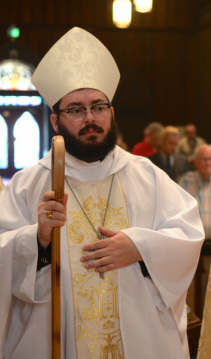
By the Grace of God, We, +Raymond, Bishop, announce that M. Rev. Ian James Louis Adkins, formerly Suffragan Bishop of this diocese, is hereby made Coadjutor Bishop of this diocese to assist us in its administration. We further announce that he shall assist us as Vicar General, Vicar for Military and Veterans Affairs, and as Director of Vocations. We are quite fortunate to have such talent for the service of God!
+Raymond
Bishop
O God, who hast appointed Thine only-begotten Son to be the eternal High Priest for the Glory of Thy Majesty and the salvation of mankind; grant that they whom He hath chosen to be His ministers and the stewards of His mysteries, may be found faithful in the fulfillment of the ministry which they have received. Through the same Christ Our Lord.
Amen.
+Raymond
Bishop
O God, who hast appointed Thine only-begotten Son to be the eternal High Priest for the Glory of Thy Majesty and the salvation of mankind; grant that they whom He hath chosen to be His ministers and the stewards of His mysteries, may be found faithful in the fulfillment of the ministry which they have received. Through the same Christ Our Lord.
Amen.
Announcements for October 6, 2014
Today we received the Decree from the Synod of Bishops appointing us (retroactively) as Missionary Bishop over the Diocese of the Midwest putting us in charge of missionary efforts throughout the Midwest and Central United States covering the states of Louisiana, Mississippi, Oklahoma, Arkansas, Tennessee, Kansas, Missouri, Illinois, Indiana, Ohio, South Dakota, North Dakota, Wisconsin and Michigan. May God be praised as we go into the mission field!
+Raymond
+Raymond
Announcements for October 5, 2014
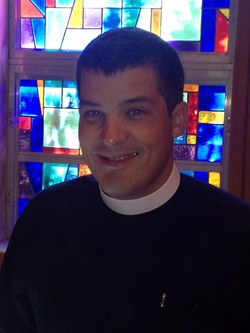 Deacon Jason Maloy, Adjunct Clergy
Deacon Jason Maloy, Adjunct Clergy
By the Grace of God, We, +Raymond, Bishop, announce the following on this 5th day of October, 2014:
We are happy to announce the reception of Deacon Jason Maloy as Adjunct Clergy. Jason was ordained in 2007 by Anglo-Catholic Bishop Louis Falk. He lives in Fayetteville, Arkansas, and will be a guest preacher for us on occasion. Jason is extremely active in local episcopal church apostolates and ministries here in Fayetteville.
+Raymond
M. Rev. Raymond L. Niblock
Bishop
We are happy to announce the reception of Deacon Jason Maloy as Adjunct Clergy. Jason was ordained in 2007 by Anglo-Catholic Bishop Louis Falk. He lives in Fayetteville, Arkansas, and will be a guest preacher for us on occasion. Jason is extremely active in local episcopal church apostolates and ministries here in Fayetteville.
+Raymond
M. Rev. Raymond L. Niblock
Bishop
 Deacon Mark Schwarz
Deacon Mark Schwarz
By the Grace of God, We, +Raymond, Bishop, announce the following on this 5th day of October, 2014:
We are happy to announce our acceptance of Deacon Mark Schwarz as a candidate for reception into the Diocese of the Uniformed Services as a Deacon and Chaplain. We anticipate he will soon be declared a candidate for the Priesthood. Deacon Mark hails from Corales, New Mexico. Deacon Mark was originally ordained into the Roman Catholic Deaconate. We are blessed to have Deacon Mark joining ministry to Veterans and Uniformed Servicemen and Women. Given his location in New Mexico, there is a huge population of active, reserve, retired, and veteran military personnel who are underserved by authentic Catholic spirituality.
+Raymond
M. Rev. Raymond L. Niblock
Bishop
We are happy to announce our acceptance of Deacon Mark Schwarz as a candidate for reception into the Diocese of the Uniformed Services as a Deacon and Chaplain. We anticipate he will soon be declared a candidate for the Priesthood. Deacon Mark hails from Corales, New Mexico. Deacon Mark was originally ordained into the Roman Catholic Deaconate. We are blessed to have Deacon Mark joining ministry to Veterans and Uniformed Servicemen and Women. Given his location in New Mexico, there is a huge population of active, reserve, retired, and veteran military personnel who are underserved by authentic Catholic spirituality.
+Raymond
M. Rev. Raymond L. Niblock
Bishop
Announcements for September 29, 2014, Feast of All Angels
By the Grace of God, We, +Raymond, Bishop of this diocese, announce the following:
On this day, 29 September, 2014, the Old Catholic Diocese of the Uniformed Services, Inc. applied for and received approval of the use of the name "Old Catholic Missionary Diocese of the Midwest" for its official corporate activity throughout its jurisdiction.
On this day, 29 September, 2014, We decree that the normative or official catechism to be used for this diocese shall be the Catechism of Saint Pius X and the Catechism of the Counsel of Trent. Because the diocese is not under Roman jurisdiction, there will be certain exceptions to doctrine and dogma as otherwise set forth in these catechetical books that will be announced from time to time.
On this day, 29 September, 2014, We decree that the following version of the Monastic Diurnal (Day Hours) shall be used by all clergy in this diocese: The English translation of the Day Hours from the Breviarium Monasticum published at Bruges in 1925. Further, We decree that the Monastic Diurnal first published in 1948 shall also be approved for use by all clergy in this diocese as currently published by the monks of Saint Michael's Abbey, Farnborough, England (UK) (Sixth Ed. 2004, Seventh Ed. 2011).
On this day, 29 September, 2014, We decree that the following version of the Monastic Office (Night Office) shall be used by all clergy in this diocese: The Monastic Breviary Matins according to the Rule of St. Benedict as originally published in 1961 by the Society of the Sacred Cross, Tymawr, Wales.
Done in Fayetteville, Arkansas, on this 29th day of September, 2014, and during the 1st Year of our Episcopate:
+Raymond
M. Rev. Raymond L. Niblock
Bishop
On this day, 29 September, 2014, the Old Catholic Diocese of the Uniformed Services, Inc. applied for and received approval of the use of the name "Old Catholic Missionary Diocese of the Midwest" for its official corporate activity throughout its jurisdiction.
On this day, 29 September, 2014, We decree that the normative or official catechism to be used for this diocese shall be the Catechism of Saint Pius X and the Catechism of the Counsel of Trent. Because the diocese is not under Roman jurisdiction, there will be certain exceptions to doctrine and dogma as otherwise set forth in these catechetical books that will be announced from time to time.
On this day, 29 September, 2014, We decree that the following version of the Monastic Diurnal (Day Hours) shall be used by all clergy in this diocese: The English translation of the Day Hours from the Breviarium Monasticum published at Bruges in 1925. Further, We decree that the Monastic Diurnal first published in 1948 shall also be approved for use by all clergy in this diocese as currently published by the monks of Saint Michael's Abbey, Farnborough, England (UK) (Sixth Ed. 2004, Seventh Ed. 2011).
On this day, 29 September, 2014, We decree that the following version of the Monastic Office (Night Office) shall be used by all clergy in this diocese: The Monastic Breviary Matins according to the Rule of St. Benedict as originally published in 1961 by the Society of the Sacred Cross, Tymawr, Wales.
Done in Fayetteville, Arkansas, on this 29th day of September, 2014, and during the 1st Year of our Episcopate:
+Raymond
M. Rev. Raymond L. Niblock
Bishop
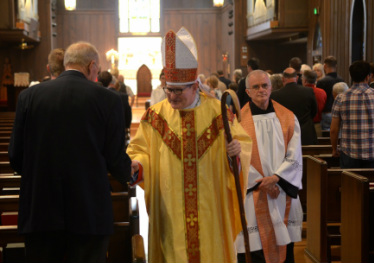
August 27, 2014, Synod Meeting
The Synod of Bishops created the Missionary Diocese of the Midwest and appointed Bishop Ray to exercise ordinary jurisdiction over a large geographical region in the central and midwest United States in order to evangelize and begin missions throughout the territory. The Missionary Diocese will generally cover the following states: Louisiana, Arkansas, Mississippi, Tennessee, Oklahoma, Missouri, Illinois, Indiana, Ohio, Kansas, Nebraska, South Dakota, North Dakota, Wisconsin, Minnesota and Michigan.
The Synod of Bishops created the Missionary Diocese of the Midwest and appointed Bishop Ray to exercise ordinary jurisdiction over a large geographical region in the central and midwest United States in order to evangelize and begin missions throughout the territory. The Missionary Diocese will generally cover the following states: Louisiana, Arkansas, Mississippi, Tennessee, Oklahoma, Missouri, Illinois, Indiana, Ohio, Kansas, Nebraska, South Dakota, North Dakota, Wisconsin, Minnesota and Michigan.
Photos from the Consecration
of Bishops Ray and Ian, August 16, 2014
of Bishops Ray and Ian, August 16, 2014

